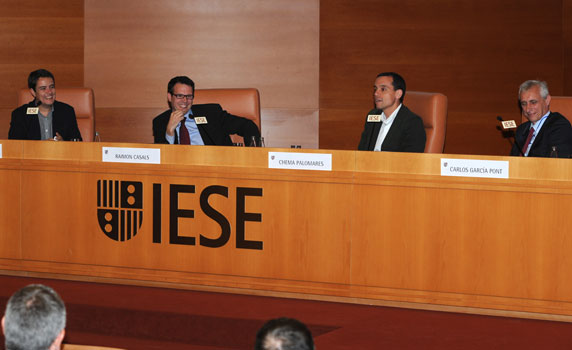
“Social networks are not shop windows where you hang a product; they are telephones you can use to communicate and interact,” said Fernando Polo, CEO of Territorio Creativo, a speaker during the Continuous Education session “Social Networks,” organized by IESE’s Alumni Association and moderated by IESE Prof. Carlos García Pont.
Social networks will play a key role in the future of companies, panelists said during the event, which was widely followed on Twitter at #IESELive.
In the 21st century, open collaborative networks – as opposed to patents – will give companies the most leverage, said Polo.
He outlined four elements that should be a part of SMEs’ social business plans: collaboration, content, connections and social heart.
“Look for contexts, learn to develop content, work connections and think openly,” he advised.
Polo said that while social networks can offer opportunities for SMEs, they can be a headache for large companies.
José María Palomare, manager of Communication and Marketing at Telefónica, responded with this Tweet: “I very much agree about SMEs, but I think that they are also a great opportunity for large companies.”
Palomares described Telefónica’s digital strategy, which is “based in online and offline integration, differentiation and relevant content.” He added that “in line with the objectives of the company, we have to be capable of building a digital identity that will allow us to be a knowledge leader in the technology sector. The best way to create differential value is by using internal resources: our employees.”
The goals of the company are now to shift to a 2.0 organization in two aspects: “in the cultural sense, and also with the goal of expanding the communication strategy from a single department to the entire organization.”
“Social networks give you a level of closeness that was not imaginable before,” said Raimon Casals, consumer relationship manager at Gallina Blanca. He stressed the positive results that can come from “active and inspired” communication.
While Twitter initiatives have been successful, the firm has not been able to generate the desired conversation on Facebook “in spite of using basic strategies,” he said. However, the firm is not giving up: “a critical mass is lacking, among other things, but we have to keep working.”
One of his slides summed up the objective of social networks: “The great brands of the future will not just be those who tell the best stories about themselves, but those that tell the best stories.”